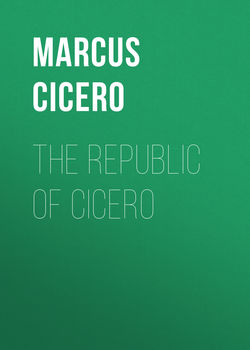The republic of Cicero

Реклама. ООО «ЛитРес», ИНН: 7719571260.
Оглавление
Marcus Cicero. The republic of Cicero
SOUTHERN DISTRICT OF NEW-YORK, ss
TO RODERICK IMPEY MURCHISON, Esq
PREFACE
INTRODUCTION
BOOK I
BOOK II
BOOK III
BOOK IV
BOOK V
Отрывок из книги
I dedicate these pages to you, my dear Murchison, that you may have a renewed assurance of my great esteem and friendship for you. I should have had a livelier satisfaction in doing so, if the part I have had in the production of them, were more worthy of your refined taste. I hope to offer some compensation, however, in the assurance, that you will find in them many congenial opinions and principles.
G. W. Featherstonhaugh.
.....
It was in the spring of the next year, that Cicero at his Cuman villa, began his famous work on government. He was now advancing into his fifty-fourth year, and it appears that he had completed his work before he entered upon his command in Cilicia. His military career was distinguished by great activity and judgment. He was saluted emperor by the army upon one of his military successes, and returned gladly to Rome at the end of the year. During the remainder of his eventful life, he appears to have found comfort only in the cultivation of philosophy and letters. The corruption of the Romans, the ruin of the republic, the death of his beloved daughter, and his separation from the wife he had lived with thirty years, embittered his days. He was too conspicuous a man not to be affected by all the political changes which took place. Crassus perished in the Parthian war; and Cæsar, as soon as he felt himself strong enough, crossed the Rubicon, which was the limit of his military command, and marched upon Rome, from which Pompey and the senate ingloriously fled. Cicero at length felt himself also constrained to follow the fortunes of Pompey, because he believed the dignity of the Roman name was alone to be found under his banners. And when the battle of Pharsalia left Cæsar sole master of the Roman world, he submitted to Cæsar, because there was no other government to submit to. But he rejoiced in his death, of which he was a spectator, and to the last, gave all the aid in his power to the patriots who sought to raise the liberties of his country. In his latter days, he showed an invincible spirit, defying the profligate Anthony in the plenitude of his power. And when the assassins of the second and more bloody triumvirate surprised him, he ordered his servants to set down the litter in which they were carrying him, and forbade them to defend him. Then undauntedly stretching out his neck, he bade his executioners do their pleasure; happy to escape from so much misery, to the immortality he had always believed in. This occurred when he was just entering his sixty-fourth-year.
This rapid sketch of the transactions of Cicero’s times, will, it is hoped, not be deemed impertinent, but may rather be considered as assisting the general reader to form an adequate estimate of the great object which Cicero had in view, when he drew up this celebrated treatise, which was to revive the veneration of the Roman people for their ancient institutions, now in danger from the machinations of lawless men, at the head of whom was Cæsar, who denying in the senate a future existence, expressed his contempt for all religion. But it has been objected to Cicero that he was insincere, and that he called upon his countrymen to venerate what was often the object of his ridicule. The leading men of Rome who formed the sacerdotal order, from the earliest periods and under all circumstances maintained their influence over the people, chiefly by that religion they had been brought up in the veneration of, and especially by the observance of auspices. But in time the credulity of the Romans began to relax. Men like Cicero had for their religion the glorious doctrine of the immortality of the soul, and a great majority of his enlightened equals no doubt entertained his opinions. Others, and among them was his brother Quintus, from various motives, as has always been the case in the history of superstitions, persevered in the prejudices they had received from education. Prejudices acquired in infancy from our earliest and dearest protectors, and to relinquish which, seems to require the relinquishment of all reverence for those we most venerate. When therefore Cicero ridicules the religious observances of his times, it is to enlightened men he sometimes addresses himself; just as men have in all times laughed at absurdities they do not care publicly to assail: and at other times he may have used his ridicule to expose the most stupid superstitions indiscriminately to all. When in his Republic he praises the institution of auspices, however he may be charged with inconsistency, it was done from great and public motives, and not from selfish ones. There is no hypocrisy in this conduct, as we understand the word; and if we examine the whole bearing of Cicero’s life, the policy which the circumstances of it, sometimes obliged him to, will not offend liberal minds. In estimating therefore the character of Cicero, it is well to remember Dr. Middleton’s remark in his preface “and in every thing especially that relates to Cicero, I would recommend the reader to contemplate the whole character, before he thinks himself qualified to judge of its separate parts, on which the whole will always be found the surest comment.”
.....